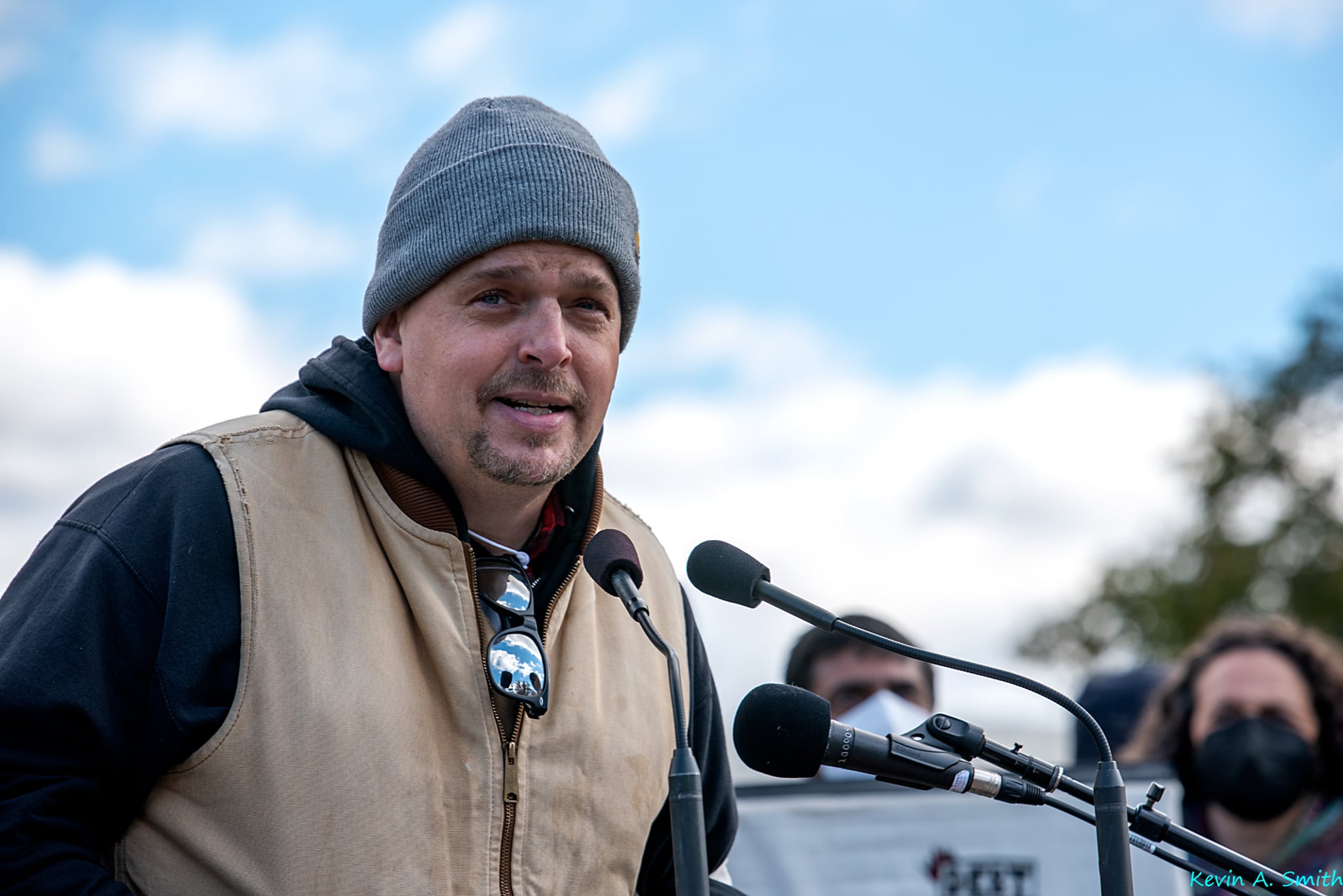Editor’s note: this is the fifth and final part of an ongoing series, “Earlham Politicos,” that investigates how alums, current students, and faculty/staff are engaging politically this election season. For part one, click here. For part two, click here. For part three, click here. For part four, click here.

John Wessel-McCoy has been at Earlham for just a little over a year as part of the Center for Career Education as a career strategist. But what folks may not know about him is that he’s been involved for at least 20 years in grassroots organizing.
“From labor to community organizing, what has remained consistent for me is the important work of building organization, leadership, and political independence of poor and dispossessed folks united across historic lines of division,” said Wessel-McCoy who is a member of the Nonviolent Medicaid Army and has been involved in the Poor People’s Campaign, which started in 2018 and has been going strong since.
Particularly of interest to Wessel-McCoy is Medicaid. He believes healthcare is a human right and is fighting for everyone to have it, particularly here in Indiana as cutoffs have gone into effect.
“The Nonviolent Medicaid Army is currently organizing around the massive Medicaid cutoffs that has been unfolding over the past couple years,” Wessel-McCoy said. “About 25 million people have lost their coverage nationwide, and we estimate about 500,000 folks here in Indiana have lost coverage in this recent period. Healthcare should be a human right, and it is a strategic issue that impacts folks in urban and rural places, across color lines.”
When asked what issues are most pressing right now, Wessel-McCoy has a lot to say and a lot he’s concerned about. He believes we are living through times of crisis and uncertainty on just about every conceivable front.
“Dr. Martin Luther King talked about how the bombs dropped in Vietnam were exploding in our impoverished communities back here in the US. This phenomenon is still true today but now it’s in Gaza and expanding in the Middle East. I can’t accept that in the richest country in the world, in the midst of all our abundance, we have about 140 million people out of a population of 330 million who are either poor or one paycheck or healthcare crisis aways from poverty,” he says.
If he sounds intense or the issues intense, it’s because he’s incredibly passionate about the organizing work he does—and we have a lot of work to do.
“King’s framework of the ‘triple evils’ of poverty, racism, and militarism was correct. We can’t fundamentally deal with one without dealing with the others. Today we have the impact of the climate crisis and ecological devastation interacting with these other evils. The thing to take away from years of organizing and education work is that we need to focus on that part of our humanity who face the impact of these evils most profoundly and most immediately. My experience can attest to the fact that poor folks can think for themselves, speak for themselves, fight for themselves, and they can lead other sections of society to a more just world.”
As far as former President Donald Trump vs. Vice President Kamala Harris is concerned, he’s not convinced by either one — but he does wish folks would get out and be active in their communities, doing more than voting, and advocates for that as much as possible.
“For those whom this economy has not been working for a long time, for those who care about and have loved ones in Palestine and see bi-partisan complicity in their suffering, for those who have seen both parties serve the interest of the wealthy and powerful even if in different ways, I defy you to argue that people don’t have good reasons to feel disaffected by our political system. I still support the need to get the vote out. I don’t deny that the stakes are high or that there are no substantive differences between Trump versus Harris all the way down the ticket. I’m just saying we need to do more than vote and post on social media.”
His concerns are more about developing a social movement led by the poor across historic lines of division; historically, that’s where power has been, he says, and while we have our work cut out for us in dismantling oppressive systems, the work can and should be done in order to have a more equitable and just world.
“The problems we face are big problems, and historically big problems require big solutions in the form of movements led by those who have the least stake in maintaining oppressive systems,” says Wessel-McCoy. Guided by a strong belief that organizing needs to happen where the people are, he’s not convinced that either party would handle Medicaid adequately. Making the world a better place ultimately is down to us.
“The world will neither come to an end nor be saved by what happens with the coming election. It could get worse for sure. But for many folks, including folks living here in our community in Richmond, things are already pretty tough. We have to stay connected to that reality and from that place, talk about politics, democracy, and what kind of society we want.”
Written by Jay Kibble, writer/editor for Earlham’s Marketing Office
***
About Earlham College
Earlham College and Earlham School of Religion foster a collaborative learning community that inspires and motivates students with transformative opportunities and experiences so they can become catalysts for good in a changing world. Located in Richmond, Indiana, Earlham is one of U.S. News & World Report’s Top 100 national liberal arts colleges and offers one of the top 20 classroom experiences in the nation, according to the Princeton Review.
Media contact
Brian Zimmerman
Assistant vice president of marketing and communications
Email: [email protected]
Phone: 765.983.1256